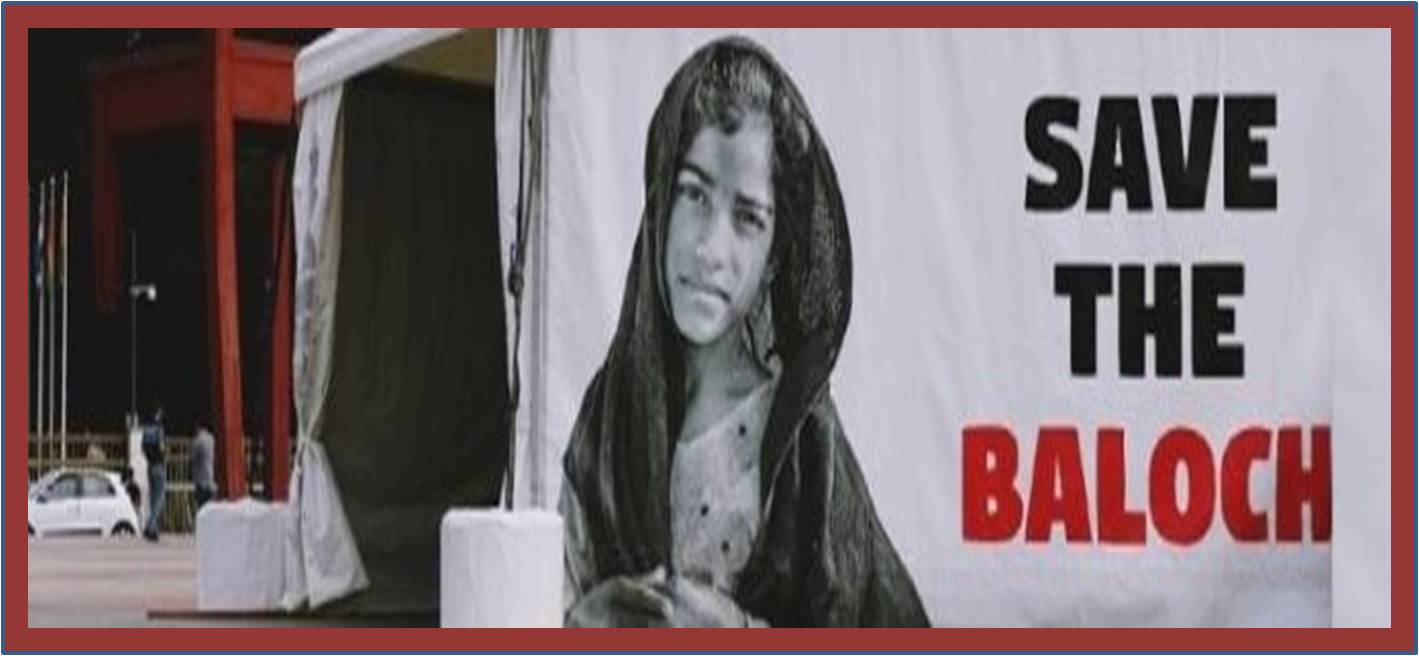Dr Allah Nizar Baloch, who heads the Balochistan Liberation Front (BLF), the oldest organization that was formed in 1964 and is fighting for an independent Balochistan, is among the most wanted men by the Pakistan Army, which is spending huge amounts to locate him as his organization has been blamed by China for not letting the China-Pakistan Economic Corridor (CPEC) attain its objectives.
“Baloch, also called the “Che Guevara” of Pakistan, along-with Balochistan Liberation Army (BLA) chief, Aslam Baloch, formed the BRAS aka Baloch Nation Liberation Coalition, which is an umbrella organisation of at least four ethnic separatist groups in Balochistan and the Sindh province of Pakistan, in November 2018.”
After a long nerve racking marathon of conspiracies, inducements, pressures and aggression, the Khan of Kalat was forced by Pakistan to sign the instrument of accession on March 27, 1948 but his country’s more than 75%, including the British Balochistan, the Makkoran, the Lasbela, the Kharan had already been invaded and illegally occupied by Pakistan before the Khan’s signing of the instrument of accession.
The Khan has written in his autobiography that he had explained to Mr Muhhamad Ali Jinnah in a meeting with him at Dhadar that he wasn’t legally, constitutionally, traditionally and morally authorized to sign the accession papers, because he wasn’t a monarch, instead he was heading a system based on Baloch traditions and democratic norms which bound the Khanate to the will of the people, expressed by a national council comprising of the notable chieftains. After independence in August 1947, the Khan Mir Ahmed Yar Khan had updated the governing system of the country by introducing a written Constitution bringing the system in line with modern democratic norms.
Due to Balochistan’s geo-strategic importance, the British authorities had planned to incorporate it into Pakistan. The process of forcible merger of Balochistan had begun on 29 June 1947 when a British serviceman had illegally announced the British Balochistan province’s accession to Pakistan. That promulgation was made by ignoring international law and the will of the people. It’s worthy to mention here that the chieftains of the Leghari, the Marri, the Bugti and the Sanjarani Baloch tribes had written letters to the British authorities expressing their wishing to rejoin their Baloch brethren in Kalat Balochistan.
When the sovereign Balochistan’s Kalat parliament rejected the proposal for the accession to Pakistan, then Pakistan’s authorities resorted to bare aggression. Pakistan’s foreign ministry had illegally announced the annexation of Kalat’s provinces of Lasbella, Kharan and districts of Makkuran to Pakistan on 17 March 1947. Forcing Mir Ahmed Yar Khan on 27 March 1948 for signing the instrument of accession was the last blow to the centuries old independence of Balochistan that laid down the basis of Baloch armed resistance against Pakistan.
In view of the above mentioned facts it’s very clear that Khan Ahmed Yar’s signature was taken by force. It lacked the free will of the Baloch people, the legal and moral requisites. So Balochistan was forcibly occupied. It can’t be termed as a legal and legitimate accession to Pakistan.
Baloch armed struggle is in accordance with international law and traditions, the United Nations (UN) charter and resolutions regarding the independence movement against colonialism. The Baloch people see the Baloch armed organizations as saviors and give them high esteem by calling them “Sarmachaar” which means “freedom fighters”.
Governments see things with the prisms of their so-called national interest. Most of the leaders of the freedom movements around the globe have at some point of their struggle been termed as terrorists by the various governments. At one time, the great Nelson Mandela was also called a terrorist by the authorities of the USA and many other governments.
“By spreading false propaganda of blaming India for Balochistan’s freedom struggle, Pakistan aims at multiple goals including the portraying of the genuine indigenous Baloch freedom movement as a proxy war against Pakistan and thereby demeaning its genuineness, secondly to cover up Pakistan’s policy of sponsoring terrorism against India and Afghanistan, and thirdly to gain public support among the Punjabi masses for its savagely military actions, war crimes and gross human rights abuses in occupied Balochistan.”
“On 22 May 2013, when China and Pakistan established the Economic Corridor, the CPEC, estimated at US dollars 47 billion, it was planned to be completed by 2018. It’s now 2022 and still it’s far from completion. It’s only Baloch armed resistance that has stood firmly in the way of this exploitative colonial scheme. Now both Pakistan’s Punjabi political elite and Army publicly acknowledge the failure of the CPEC while blaming each other for the failure.”
The most active armed organizations, the BLF, the BLA (J) and the BRG have formed an alliance named BRAS in 2018. It’s easy for outside observers to find which are the most genuine organizations that are connected to the people on ground . One way is to monitor their activities, not their claims.
The Baloch armed organizations have enough freedom fighters to chase their goal of independence. Nevertheless, it would be unwise for them to disclose the real strength of their members, their organizational structure and command and control systems. Their consistent fighting against Pakistan’s occupation is enough to show their strength, their institutions and discipline.

The goals of Baloch independence movement and the Tehreek-e-Taliban Pakistan (TTP) have no nexus. The fighting grounds of both are separate and far from each other. However, both, the Baloch and the TTP are fighting against a common enemy, that’s Pakistan and its hypocrite Army, so naturally the armed resistance of both the groups support each other by dividing the attention of the enemy and its military strength, which Pakistan’s dishonest media, observers and intelligence portray as “coordination”.
It’s time to take action against Pakistan for its crimes in occupied Balochistan and help the Baloch struggle for independence, as in view of the prevalent nation state system, Balochistan’s independence is a legitimate and lawful goal.

